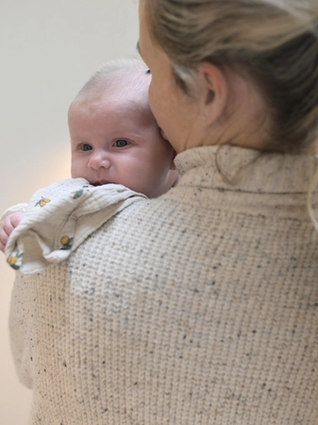
- Home
- Advice Hub
- Newborn
- Essential Newborn Care
- How Do Newborns Communicate?
How do newborns communicate?
In this guide, we'll explore how babies typically learn to communicate and share practical tips on how to support and encourage their speech development.
As parents, one of the most exciting child development milestones we eagerly await is when our baby starts talking. Those first words hold immense joy and significance. However, the journey to speech development starts long before those initial utterances. As proactive caregivers, we play a vital role in nurturing our babies' language skills. In this guide, we'll explore how babies typically learn to communicate and share practical tips on how to support and encourage their speech development.
How should you expect your baby to communicate?
Every baby is unique, and the timeline for how speech and language develops can vary between children. Generally, babies start uttering their first words between 10 and 15 months of age. However, this doesn't mean they're silent before then. From birth, newborn babies start to communicate through crying, cooing, gurgling, facial expressions and moving their arms and legs (e.g. to show they are uncomfortable or excited). These early sounds and movements lay the foundation for future language skills.
How do babies learn to communicate?
Babies learn to communicate when we talk and play with them throughout the day. Here are 5 top tips for supporting your baby in everyday interactions:
- Get their attention: Babies can only focus their attention on one thing at a time, so make sure you get their attention when you’re talking to them. Try calling their name, stroking their face, tickling their feet or giving them a cuddle to make a connection with them. Singing nursery rhymes to your baby or using a sing-song intonation (also known as “Parentese”) is another great way to support your baby to focus on you. Minimise distractions by reducing background noise (e.g. turning off the TV) and having some quiet time together.
- Get face to face: Babies are fascinated by faces, especially those of their caregivers. Engage in frequent face to face interactions with your baby. Make eye contact, smile, and mirror their facial expressions. Playing face to face with your baby shows that you are interested in them, provides essential social cues and encourages language development. It also helps you to tune into your baby and what they might be trying to communicate with you through the noises they make, the way they move their bodies and their facial expressions.
- Be responsive: When your baby moves their body and makes sounds, respond enthusiastically. Mimic their actions and sounds and add words to create a "conversation." This back-and-forth interaction, known as "serve and return" fosters brain development and reinforces the importance of interacting with others. It also teaches your baby early turn-taking skills.
- Narrate your day: Describe your daily activities to your baby as you go about your routine. Whether you're cooking, cleaning or running errands, talk to them about what you're doing, as well as what they can see and hear. This helps expose your baby to a variety of words and concepts, laying the groundwork for vocabulary development.
- Read together: Reading to your baby is one of the most effective ways to promote communication development. Young babies love looking at board books with black and white pictures. Even before babies understand that words hold meaning, they are calmed by the sound of your voice and benefit from the rhythm, intonation and opportunity to connect with you while you snuggle up together.
How often should you talk to your baby?
Babies practise their communication skills when they are interacting with others, so talking and playing with your baby as much as possible, throughout the day really is the best way to support their speech and language development. Every coo and gurgle is a step toward your baby learning to talk with you! Embrace this precious time with your baby and celebrate each milestone along the way.
Advice & tips

Want to read more? Join the HiPP BabyClub for full access to this article.
As a BabyClub member, you'll get access to a range of exclusive benefits, including:
Monthly competitions
Discounts from our Partners
Expert advice tailored to your little one's age
Weaning recipes
HiPP shop discounts*
*10% off HiPP's online shop does not apply to our First Infant, Anti-Reflux or Comfort Formula Milk.
Important notice: Breastfeeding is best. Follow on milk should only be used as part of a mixed diet from 6 months. Talk to a healthcare professional.




